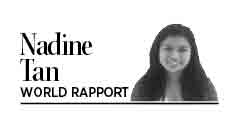Even political correctness has its limits
As students and members of the USC community, we are acutely aware of the dangers around campus. Fortunately, the Department of Public Safety does an excellent job of keeping community members protected and informed of incidents by publicizing crime alerts and demonstrating a commitment to providing students with crucial information about our safety.
In a larger context, we are also conscious of the fact that there are threats to our national security. Earlier this month, the government released several reports on terrorism.
The Department of Homeland Security’s Quadrennial Homeland Security Review and the Pentagon’s Quadrennial Defense Review outline the homeland security strategy for the next four years, but there was something unusual about both reports.
Though they included extensive wording on terrorism and extremism, neither report mentioned any derivatives of “Islamism” whatsoever. Instead, the writers chose words like “violent extremists” and “al Qaeda” to describe the suspects. Of course, the writers refused to acknowledge that this was a purposeful omission,
Previously, in 2008, the National Counterterrorism Center (NCTC) published “Words that Work and Words that Don’t: A Guide for Counterterrorism Communication,” a report discouraging the use of the words “Muslim” or “Islamic” to describe terrorist threats. According to the NCTC, doing so perpetuates the “U.S. vs. Islam framework” that only detracts from finding a solution.
While it is imperative not to make a connection between the words “Muslim” and “terrorist” this particular situation might prove problematic.
Being politically correct is one thing, but it is another to omit facts for fear of creating a bigger mess.
A number of critics have surfaced to evaluate the reports. Sen. Susan Collins deems the “glaring omission” made by the two agencies unacceptable. She said, “While there are other threats to our national security from other types of violent extremism, the gravest threat comes from Islamist extremists … In a review such as this, it is critical that we identify and address the specific threat posed by Islamist extremism.”
Identifying the enemy — their background, nationality, race, religion — is crucial to combating threats. In our microcosm of the world, DPS alerts us with details about suspect appearances.
For example, a recent crime alert from Feb. 19 describes a suspect of a strong armed robbery as being a black male, listing his height, weight and dress. Isn’t the point of filing such reports to alert people of all necessary facts? It promotes transparency and, thus, a greater awareness of our safety.
Is it religion’s involvement that complicates the situation? Are we okay with providing biological facts about a suspect but would prefer to steer clear of bringing the issue of religion into the fray?
Perhaps it isn’t bigoted to claim that Muslim extremists are the most significant threat to national security, when that might actually be the case. Of course, it is important not to rely on prejudices and stereotypes. But the country’s so-called “collective guilt,” when it comes to repenting for the sins of the past — for enacting racist laws and breeding narrow-mindedness, among many other things — surely shouldn’t continue perpetually.
With all due respect and without incensing the masses, it is important to realize that being politically correct can only take us so far. Sometimes, it takes us in the wrong direction.
It doesn’t help that the Department of Homeland Security’s report was the first of its kind from the department. By creating the precedent of omitting this sort of crucial information, what does it mean for our security? Is it protecting the identities of the suspects? Is it taking measures to be politically correct to avoid stepping on the toes of human rights activists?
The NCTC suggests using “death cult” to describe terrorists. Is that a better way to characterize these individuals? I think not.
If this is a matter of a mere error in semantics or of staying on every party’s good side, then those policymakers have failed to achieve their goals.
Nadine Tan is a sophomore majoring in international relations. Her column, “World Rapport,” runs Fridays.


Love the lead-in! I definitely agree that sometimes the crucial facts are compromised in order to avoid hurting anyone’s feelings.
This article is full of hypocrisy and political correctness. All of us know that we fighting our crusades against Islam and Muslims all over the world. Trying to use words like “Islamism” and “Islamist” sounds like bogus cover against the truth.
Agree with the article. Also, smart people know that “Islamism”, the jihadist movement to destroy non-Muslims and take over the world, is not the same thing as “Islam”, the religion. Islamic extremists are no friends to mainstream Muslims — a study recently showed that almost ALL of the victims of Islamic terrorism are themselves Muslim: http://www.washingtontimes.com/news/2010/jan/14/al-qaeda-hurts-muslims-most/. Our leaders should be able to make it clear that we are fighting militant Islamism, call it “jihad” if you want, but that we are not at war with Islam.